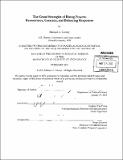| dc.contributor.advisor | Stephen Van Evera. | en_US |
| dc.contributor.author | Glosny, Michael A | en_US |
| dc.contributor.other | Massachusetts Institute of Technology. Dept. of Political Science. | en_US |
| dc.date.accessioned | 2012-09-13T18:56:26Z | |
| dc.date.available | 2012-09-13T18:56:26Z | |
| dc.date.copyright | 2012 | en_US |
| dc.date.issued | 2012 | en_US |
| dc.identifier.uri | http://hdl.handle.net/1721.1/72850 | |
| dc.description | Thesis (Ph. D.)--Massachusetts Institute of Technology, Dept. of Political Science, 2012. | en_US |
| dc.description | Cataloged from PDF version of thesis. | en_US |
| dc.description | Includes bibliographical references (p. 491-547). | en_US |
| dc.description.abstract | This dissertation asks: what explains variation in how other great powers respond to rising powers? It tries to explain why the emergence of a rising power sometimes leads to tension, rivalry, and war, and other times leads to less competitive responses. This project analyzes the effect of the rising power's grand strategy-whether it is reassurance or coercion--on the severity of the balancing response by the other major powers. I develop a theory of successful reassurance that shows how a rising power can prevent or minimize the severity of the balancing response by other great powers. Reassurance can limit the balancing response through two causal mechanisms: 1) reduced estimates that rising power is a threat; and 2) reaping the benefits from a rising power. I also develop a theory of coercion backfire that shows how a rising power that implements a grand strategy of coercion is more likely to make others feel especially threatened, and therefore more likely to provoke an early and especially firm response, exacerbating the severity of the balancing response. I apply this theory to explain the balancing responses to the rise of Germany from 1871 to 1907 and the rise of China in the post-Cold War world. The empirical tests and process tracing evidence demonstrate that rising powers, contrary to the expectations of most realist balance of power and rationalist accounts, have considerable agency to affect the balancing response. In the cases of the rising powers of contemporary China and Bismarckian Germany, grand strategies of reassurance convinced states to minimize the severity of their balancing responses, even as the rising power's material power continued to grow. In contrast, Wilhelmine Germany's grand strategy of coercion antagonized the other powers and pushed them to respond by balancing very severely. For the contemporary case of the rise of China, I use a variety of sources such as Chinese-language materials and extensive interviews from over two years of field work in China and Asia to examine China's grand strategy of reassurance and its effect on the responses by the United States, Japan, Russia, and India. | en_US |
| dc.description.statementofresponsibility | by Michael A. Glosny. | en_US |
| dc.format.extent | 547 p. | en_US |
| dc.language.iso | eng | en_US |
| dc.publisher | Massachusetts Institute of Technology | en_US |
| dc.rights | M.I.T. theses are protected by
copyright. They may be viewed from this source for any purpose, but
reproduction or distribution in any format is prohibited without written
permission. See provided URL for inquiries about permission. | en_US |
| dc.rights.uri | http://dspace.mit.edu/handle/1721.1/7582 | en_US |
| dc.subject | Political Science. | en_US |
| dc.title | The grand strategies of rising powers: reassurance, coercion, and balancing responses | en_US |
| dc.type | Thesis | en_US |
| dc.description.degree | Ph.D. | en_US |
| dc.contributor.department | Massachusetts Institute of Technology. Department of Political Science | |
| dc.identifier.oclc | 807270205 | en_US |
